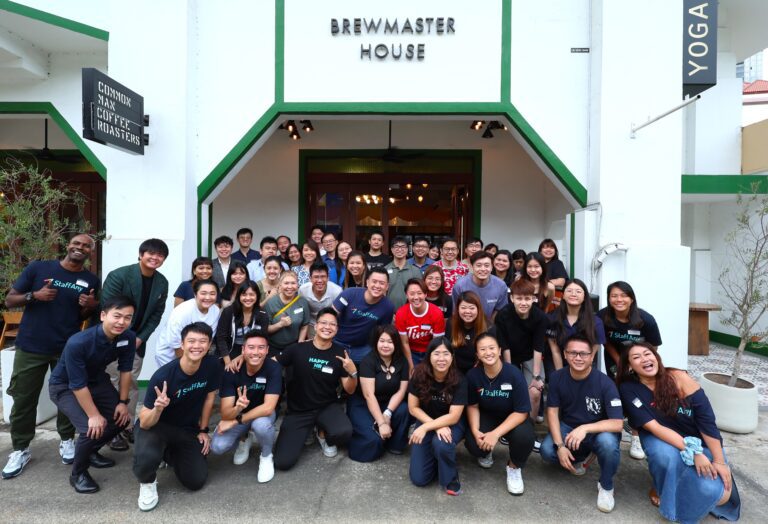Small business human resources, especially in the F&B industry, face critical challenges, particularly when it comes to managing their employees. From ensuring employee satisfaction to complying with labour laws, F&B small business owners have a lot on their plate. However, effective human resources management can help address these challenges and lead to a number of benefits.
This comprehensive guide will provide a clear overview of what human resources management is, why F&B small businesses need it, the benefits of having a human resources department, and the steps to set one up.
What is Human Resources Management?

Human Resources Management (HRM) is the process of managing an organisation’s workforce. The ultimate goal of HR processes is to create an environment where employees can thrive, which can help improve the business’s overall success.
It is a crucial aspect of running a successful business that involves the management of an organisation’s workforce, including tasks such as recruiting and hiring employees, training and developing them, compensating and benefiting them, and managing employee relations.
HRM is a complex and multifaceted field, encompassing a wide range of responsibilities. From attracting and retaining top talent to ensuring compliance with relevant laws and regulations, HR team play a critical role in the success of an organisation.
They must possess a deep understanding of labour laws, compensation and benefits, employee relations, and talent management, among other areas. In addition, they must be able to communicate effectively with employees at all levels of the organisation and work closely with other departments, such as finance and legal, to maintain compliance and efficiency within the company.
Do F&B Small Businesses Need Human Resources Management?
Yes, F&B small businesses need HRM just as much as larger organisations. Effective HR strategies can help manage the specific and unique difficulties faced by small F&B businesses, such as frequent employee turnover and a dynamic workforce. Furthermore, small businesses are also subject to the same labour laws and regulations as larger companies, and proper HR management can help ensure compliance.
Effective HR strategies can help manage the specific and unique difficulties faced by small F&B businesses, such as frequent employee turnover, building a conducive company culture, and managing dynamic workforce. Furthermore, small businesses are also subject to the same labour laws and regulations as larger companies. Small business HR professionals can help ensure compliance.
Benefits of Having Human Resources Management for F&B Small Business

Having a human resource management can bring a number of benefits to F&B small businesses. Here are several compelling reasons why small businesses should prioritise investing in human resources:
1. Improved Employee Retention
By providing a positive work environment and offering competitive compensation and benefits packages, a well-run HR department can help improve employee retention. This can help reduce the costs associated with high turnovers, such as the time and resources required to recruit and train new employees.
2. Better Compliance with Labour Laws
F&B small businesses are subject to the same labour laws and regulations as larger companies. A dedicated HR department can help ensure compliance with these laws and regulations, reducing the risk of legal action and protecting the business’s reputation.
On the other hand, HR professionals should stay up-to-date with employment laws, wage requirements, safety standards, and other legal obligations specific to the F&B industry. Thus, compliance minimizes legal risks, penalties, and potential reputational damage for F&B itself.
3. Increased Productivity
Effective HR management can lead to increased employee morale, which can, in turn, lead to increased productivity. When employees feel valued and supported, they are more likely to be engaged and motivated, which can result in higher output levels.
4. Improved Recruitment Process
A well-run HR department can help streamline the recruitment process, making it easier for F&B small businesses to attract and hire top talent. This can include developing effective job postings, conducting thorough candidate screenings, and negotiating competitive compensation packages.
5. Improved Workplace Culture
A positive workplace culture can have a significant impact on employee morale and satisfaction, and this can be achieved through effective HR management.
By implementing policies and practices that promote fairness, transparency, and open communication, HR can help create a workplace culture that supports employee well-being and helps to attract top talent.
This can include promoting work-life balance, offering employee development opportunities, and fostering an inclusive work environment. A strong workplace culture can also increase employee engagement and commitment, leading to higher productivity and overall success for the business.
6. Organizational Development
Human resources professionals might contribute to the overall growth and development of F&B small businesses. HR professionals identify organizational needs, facilitate change management processes, and implement strategies for business expansion, restructuring, or diversification.
HRM ensures that the workforce is aligned with the business’s strategic goals, supporting sustainable growth and long-term success.
7. Employee Well-being and Work-Life Balance
HRM focuses on employee well-being and work-life balance in F&B small businesses. By implementing policies and initiatives that support work-life balance, such as flexible schedules, employee assistance programs, and wellness initiatives, HR professionals enhance employee satisfaction, reduce stress, and improve overall organizational morale.
8. Performance Management
HRM establishes performance management systems to set expectations, provide feedback, and evaluate employee performance.
By implementing performance appraisal processes, HR professionals align individual goals with business objectives, identify areas for improvement, and recognize outstanding performance. Effective performance management improves accountability, productivity, and overall organizational performance
Read more: 10 Best Tips for Managing Restaurant Staff
9. Employee Relations and Conflict Resolution
HRM handles employee relations, fostering positive relationships between employees and management. HR professionals act as intermediaries, addressing conflicts, resolving issues, and promoting open communication.
Healthy employee relations contribute to a harmonious work environment, teamwork, and collaboration, creating a positive customer experience.
10. HR Recordkeeping
HR maintains accurate and up-to-date employee handbook, handling documentation related to employment, such as contracts and agreements. Effective recordkeeping is essential for compliance, decision-making, and strategic planning.
In a small business, the HR function often requires HR professionals to wear multiple hats and perform a wide range of tasks. Their role is critical for building a strong and motivated workforce, ensuring legal compliance, and contributing to the overall success and growth of the business.
Steps to Set Up a Human Resources Department for F&B Small Businesses

For F&B small businesses, establishing a human resources department can be a daunting task. However, with the right approach, it can be a valuable investment that brings many benefits to the company. Here are the steps to set up an HR department for a small business:
1. Determine Your HR Needs
The first step in setting up an HR department is to determine the specific needs of your business. This may include determining the size of your workforce, the types of positions you need to fill, and the compensation and benefits packages you need to offer.
By taking the time to assess your HR needs, you can ensure that your HR department is equipped to meet the specific demands of your business.
2. Create an HR Strategy
Develop a clear HR strategy that aligns with your business objectives and outlines the role of HR in achieving those objectives.
3. Designate HR Responsibilities
Assign HR responsibilities to a dedicated HR professional or team member, or consider outsourcing HR functions if resources are limited.
4. Legal and Regulatory Compliance
Familiarize yourself with local, state, and federal labor laws that apply to F&B businesses. Ensure labor law compliance with wage and hour laws, safety regulations, and other employment-related legislation.
5. Hire an HR Professional
The next step is to hire an HR professional. This may be a dedicated human resources manager or an outside external consultant, depending on the size of your business and the specific demands of your HR needs.
It is important to choose someone with a strong background in HR and a deep understanding of local labour laws and regulations.
6. Communicate HR Policies and Procedures
Once you have developed your HR policies and procedures, it is important to communicate them effectively to all employees. This may include conducting employee training sessions, distributing written materials, and ensuring that all employees know the expectations and responsibilities associated with their jobs.
Communicating HR policies and procedures effectively can help ensure that everyone is on the same page and working towards the same goals.
7. Employee Relations and Communication
Create channels for open communication between management and employees. Address employee concerns, mediate conflicts, and maintain a positive work environment.
Setting up an HR functions for a small business in the F&B industry can be complex and challenging, but the benefits are well worth the effort.
By taking the time to determine your HR needs, hire an HR professional, develop HR policies and procedures, and communicate these effectively to all employees, you can ensure the success of your HR department and the overall success of your business.
Streamline your Human Resources Management Process with HR Software
For F&B small businesses looking to streamline their HR management, consider using a Human Resource Information System (HRIS) like StaffAny. Manage your team’s schedules, time tracking, and timesheets easily all in one place. With StaffAny, you can integrate HR and Operations seamlessly with our all-in-one solution for workforce management, making HR tasks easier and more efficient.
StaffAny also offers a range of other HR management tools that can help you manage your workforce more efficiently. Contact us here to learn more about StaffAny and our powerful HR management tools!






